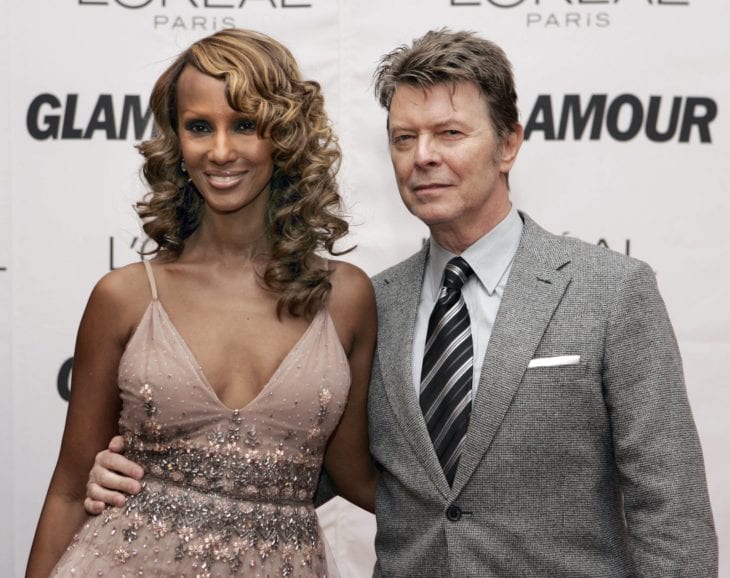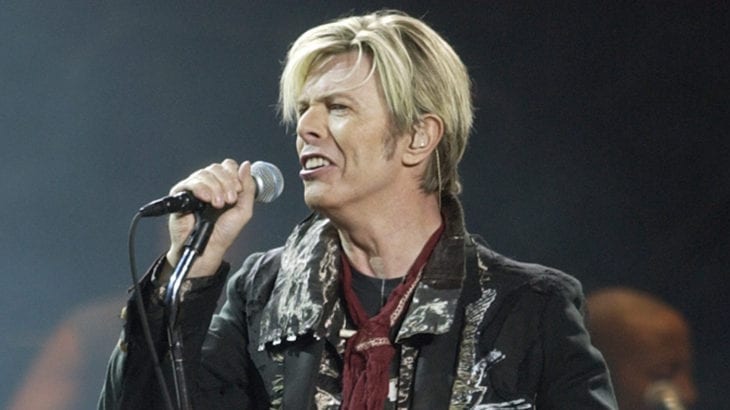I’ve known for the last sixteen years of my life that one day I would read the news and the headline would be that David Bowie had died, and I wondered what would happen next. Now I know. David Bowie died peacefully last night, January 10, 2015, after battling cancer for a year and a half. He had just celebrated his 69th birthday, and he’s succeeded by his wife, Iman, and his children: the filmmaker Duncan Jones, his daughter Alexandria Zahra, and then all the rest of us – every musician who wouldn’t have a career without David Bowie’s inspiration, every artist who couldn’t dream the impossible things they dream without David Bowie’s guidance, and every fan who just wouldn’t be the person they are without David Bowie’s music.

Source: Getty Images
David Bowie will get thousands of eulogies today, which only speaks to how broadly he has touched our culture. Normally when someone very famous dies, I refrain from adding to the noise, because what can I really say about most very famous people, not knowing them? But my grief today is much bigger than what I ever could have expected, so here goes.
All I’ve wanted my whole life is to be my truest self in an unfettered way. My truest self is gay and androgynous -and cross-dresses and refuses categories. My truest self writes weird, fractured prose-poem-type science fiction. My truest self models itself after fictional characters. It constantly has bright ideas that fade really quickly, it changes its mind and its body a lot, and it feels isolated and lonely almost all the time. David Bowie convinced me that being isolated and afraid and most of all weird made me a normal, feeling human being.

David Bowie, shown here in concert in 2003, considered selling his music catalog but ultimately opted to securitize his royalties instead
I would say that David Bowie fearlessly changed himself over and over in the last five decades, but on the one hand I don’t know if he wasn’t afraid when he was dressing like an alien to be Ziggy Stardust or dressing in drag, or pouring his addiction and hollowness out to the public on the Berlin Trilogy, and on the other hand I don’t think he changed all that much, at the very, very core. Certainly, the things he talked about in the music were always same, as he describes in a well-circulated 2002 quote: “The trousers may change, but the actual words and subjects I’ve always chosen to write with are things to do with isolation, abandonment, fear and anxiety, all of the high points of one’s life.” But the point, for me, is that whether or not he was afraid, he had the courage to say and be what was true to him.
He promises, in the last moments of The Rise and Fall of Ziggy Stardust and the Spiders from Mars: “I’ve had my share, I’ll help you with the pain – you’re not alone.” For the last sixteen years, being a fan, I’ve been able to hold on to that promise and take solace, knowing that there is at least one other person in the world who has felt what I feel, and that has carried me through a lot of dark moments. The grief, today, is that that person is gone.
The solace is that every other lonely, fearful, anxious, abandoned, isolated, weird person is out today, mourning our emotional father. The solace for me, too, is that I got engaged on January 4, 2015, outside of the Museum of Contemporary Art after hearing Neil Gaiman read “The Return of the Thin White Duke” to close out the David Bowie Is exhibit. What I learned as a David Bowie fan is that there are millions of us super freaks out in the world; it’s just about everyone. I’ve been taking Bowie’s lead for the last sixteen years, trying to be as true to my truest self as I can, and in doing so I’ve made a family and friends with precious other lonely, scared, beautiful, brilliant people.
I don’t know how to conclude and I don’t want to, because a conclusion on an obituary or a eulogy is the period on the sentence of a person’s life, and I don’t want to let go of David Bowie. I’ll end on his lyrics to “Lazarus” from Friday’s release, Blackstar, what appears to be a carefully-planned goodbye to his fans. There’s no way to say “Thank you, so much” to someone who can’t hear you anymore, but I can at least hope that Bowie once again makes good on this last promise he gives us:
“This way or no way
You know I’ll be free
Just like that bluebird
Now, ain’t that just like me?”
Original by Rebecca Vipond Brink
